|
Ship Dock (Next the Pier 1866) / Church Street / King
William Street
Greenwich
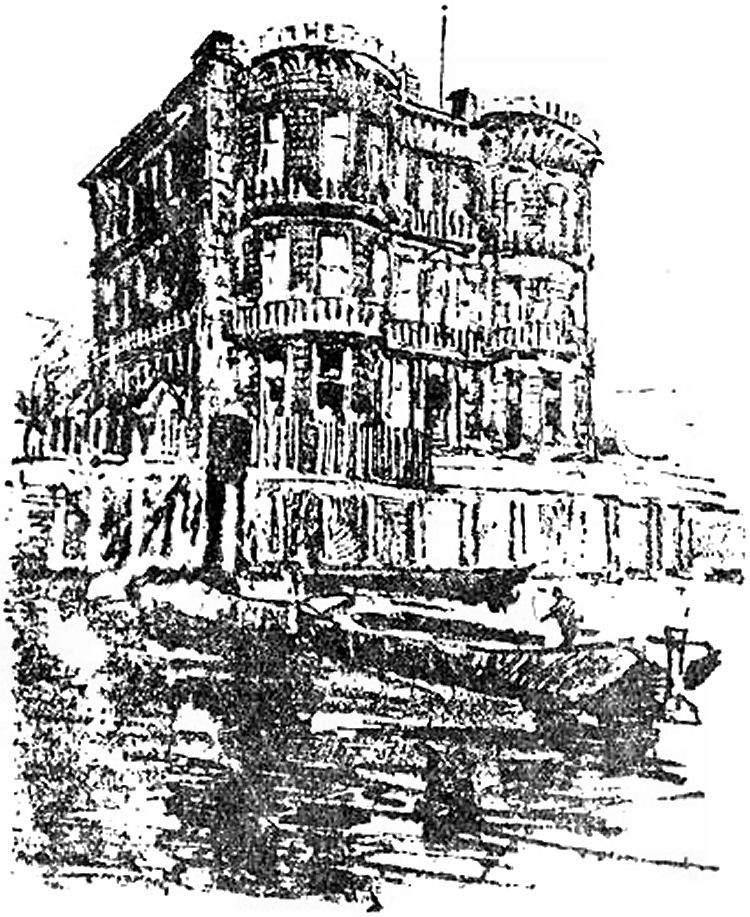
Above print from the book "Dickensian Inns and Taverns, 1822." |
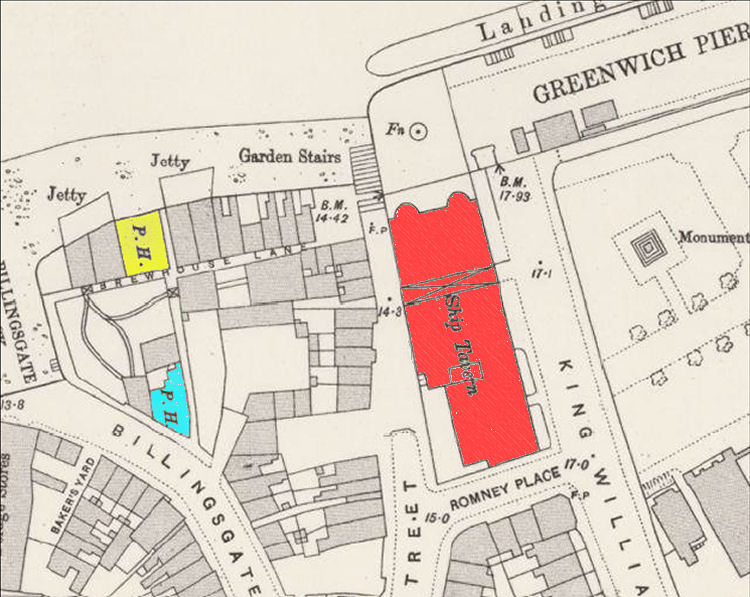
Above map 1893 showing the location of
"Fubb's
Yacht."
"Sugar
Loaf,"
"Ship Tavern." |
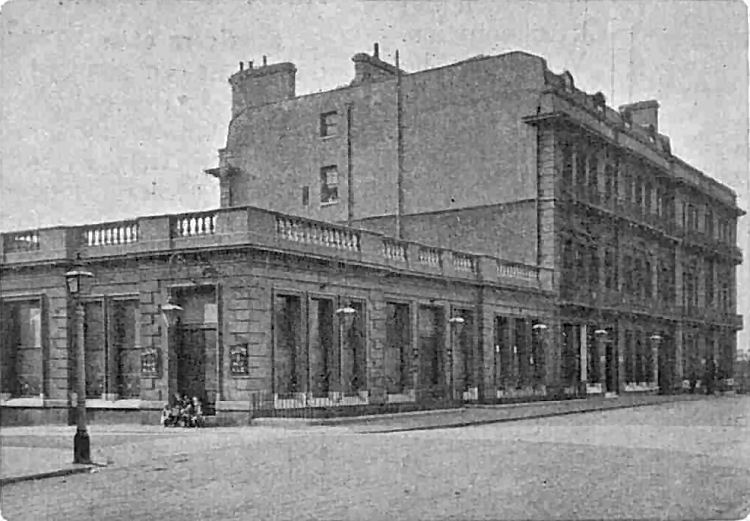
Above photo from the Tatler, 30 September 1903.
The above paper goes on to say the following:- Which has fallen on
evil days and come into the Bankruptcy Court. The "Ship" had most
interesting political . For three generations cabinet ministers used to
meet there at the close of the session for a whitebait dinner. The last
occasion of a whitebait dinner was on August 15, 1894, when Lord Rosebery's ministry dined at the "Ship." |
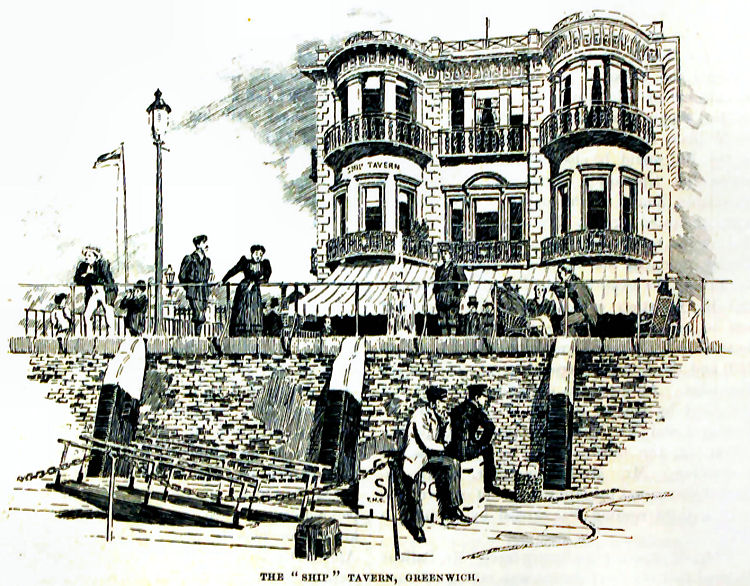
Above illustration from Cassell's History of England, circa 1905. |
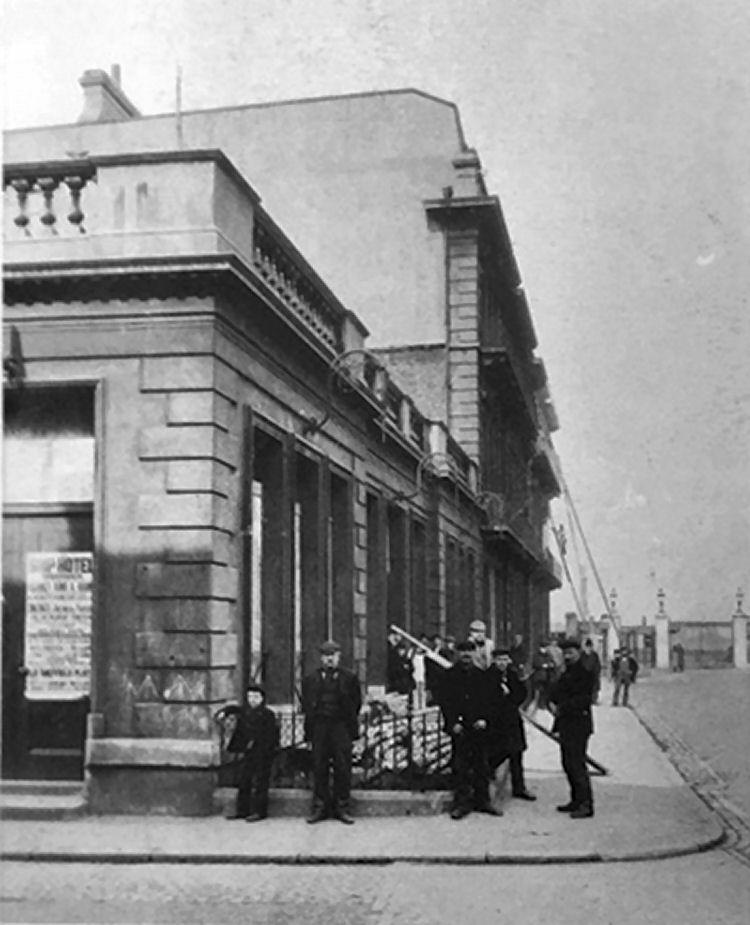
Above photo, 1908. |
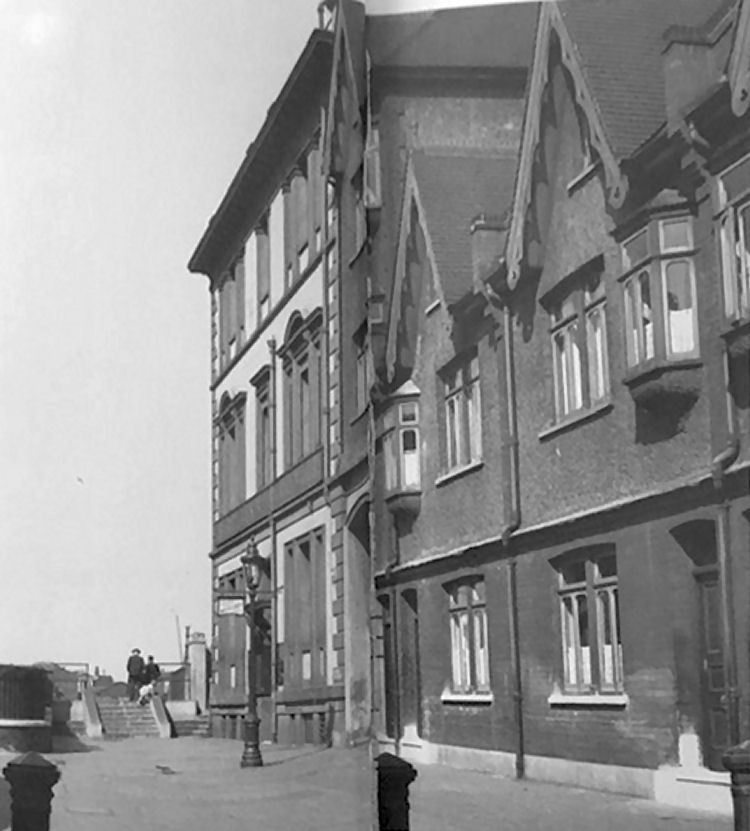
Above photo, circa 1908. |
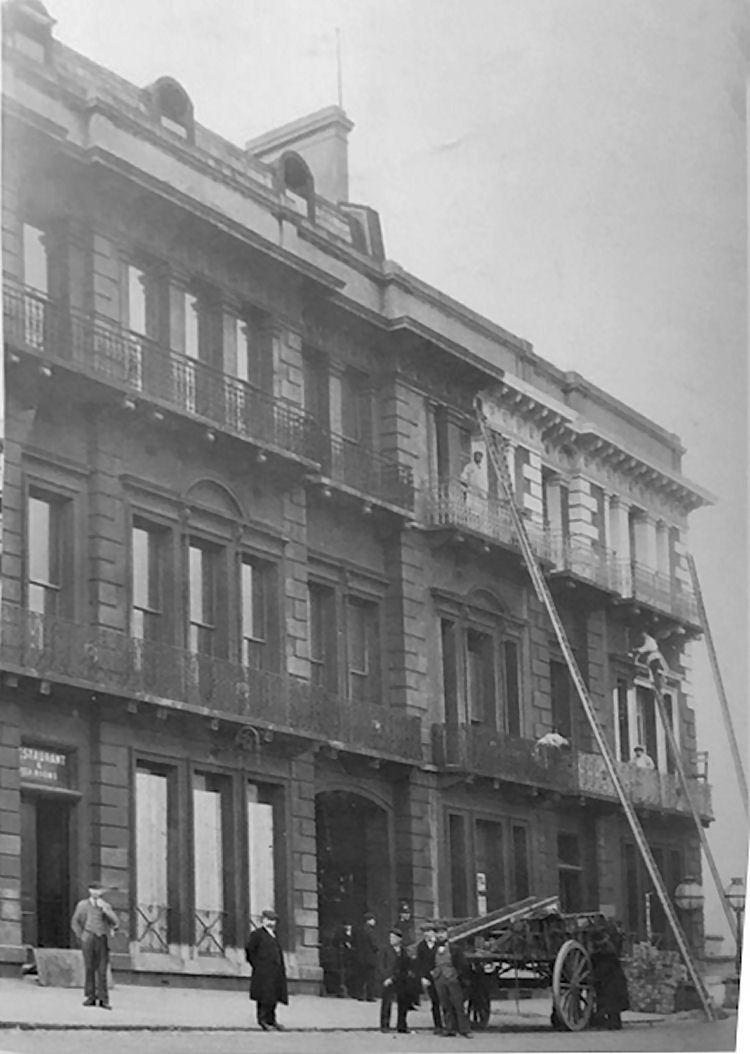
Above photo circa 1908. |
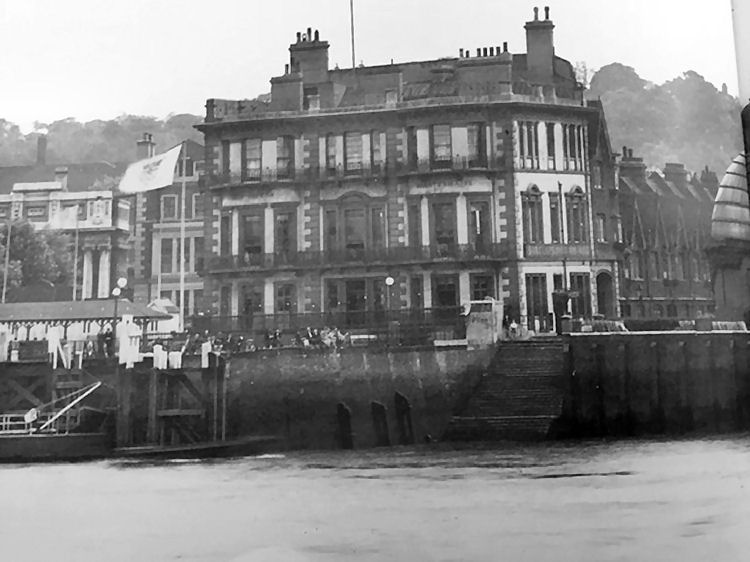
Above photo, circa 1937. |
|
From the Kentish Gazette, 10 June 1845.
An unpleasant event happened at the "Ship Tavern," Greenwich, on
Wednesday night last. A party had dined at the tavern, and on its
breaking up, a one horse chariot or fly was being brought to the door by
the driver, when the horse rushed forward, threw the coachman, who was
seriously bruised, and plunged down the descent into the river, with the
chariot at his heels; and before the least exertion could be made, got
so involved in the stream as to be instantly drowned. The watermen
contrived to make fast the carriage to a chain on shore, or it would
have been washed away with the rising tide.
|
|
Morning Advertiser, Friday 11 May 1855.
Greenwich Whitebait Dinners.
Thomas Quartermain respectively informs the nobility and public that he
has opened his new tavern, the "Ship," which he intends to conduct on
the same principle as the old one, the "Crown and Sceptre," and solicits
their patronage to both houses.
Orders can be given at the "York Hotel," New Bridge Street, Blackfriars.
May 5th, 1855.
|
|
From the Borough of Greenwich Free Press, 9 August, 1862.
Richars Hughes, foreman of the waiters at the "Ship Tavern,"
Greenwich, was ordered to find bail in £20. for 3 months, for
threatening Horatio Bell and creating a disturbance.
|
|
Morning Advertiser, Saturday 08 June 1867.
Committal of an Hotel Clerk for robbing his employer.
Henry Tythe Cheslett, a respectable dressed man, was charged with
collecting money on account of his employer, Mr. Thomas Quartermain, of
the "Ship Hotel," Greenwich, and appropriating the same to his own use.
It appears that the prisoner entered the service of the prosecutor in
March last, as clerk, his duty being to keep the accounts of the
establishment, but neither to deliver bills nor to call upon customers
for payment. On the 24th of May the prisoners asked leave to go to
London, which was granted him by the manager, and he then went to the
accountant and asked for a Sovereign, which was handed to him, he stated
that the manager knew all about it. The prisoner did not afterwards
return, and it was then ascertained that he had called upon Mr. John
Cooper Foster, surgeon, of St. Thomas Street, Southwark, and presented
an account of £3 0s. 6d, payment of which was made by means of a crossed
cheque upon the London and Westminster Bank. The prisoner took this
cheque to Mr. Weaklin, stationer, of 91, Farringdon Street, City, and
producing Mr. Quartermaine's card, said he was the collective, and
having left home without small change, asked him to cash it. Mr. Weaklin
did so, the prosecutor being a customer. A second cheque for £9 3s. 6d.
(also crossed) had been obtained from another gentleman in the City, and
which had been left as security by the prisoner for an advance of £4
from another person.
The depositions having been completed, Mr. Maud committed the prisoner
for trial.
|
|
Hull Daily Mail, Tuesday 22 November 1887.
FIRE AT THE SHIP HOTEL, GREENWICH.
Late on Monday night a fire, which did a large amount of damage,
occurred at the well-known "Ship Hotel," Greenwich. A boy, who was
passing about 10.30, saw a glare in the window, and gave the alarm, but
though the fire brigade was soon on the spot, and there was a plentiful
supply of water, it was over two hours before the flames were subdued.
The two top floors used as stores and dormitories were burned out, and
the rest of the building seriously damaged.
|
|
St James's Gazette, Tuesday 22 November 1887.
SERIOUS FIRE AT THE SHIP HOTEL, GREENWICH.
At a late hour last night a fire, which resulted in great damage being
done, occurred at the "Ship Hotel," Greenwich. It was discovered about
five-and-twenty minutes to eleven o’clock, when a boy who was passing
along Church-street saw a glare in the windows at the top of the
establishment fronting Church-street. He immediately communicated the
news to the people in the hotel-tap. Cries of “Fire!” were raised and
the alarm soon spread in the neighbourhood, “the Ship was on fire.” In a
minute or so flames burst out of the windows and through the roof. The
Greenwich Fire Brigade, under Engineer Chatterton, quickly repaired to
the spot with their manual-engine; but it was soon seen that assistance
was required, and steamers were sent from Deptford, Rotherhithe, and
other South London stations. By midnight all danger of fire attacking
the King William-street portion of the hotel was at an end. In the
meantime some of the Southwark Salvage Corps had arrived, and much of
the furniture, etc., was preserved from damage, By one o’clock this
morning the flames had been extinguished; but at that hour water was
still being poured on the debris. The following is the official report
of the damage:—
“A building of five and six floors, about 120 ft. by 65 ft.; about 70
ft. by 30 ft. of the two top floors (used as stores and dormitories) and
contents nearly burned out and roof off; rest of building and contents
damaged by smoke, water, and breakage.” The fire is supposed to have
originated through the kitchen-flue becoming over-heated.
|
|
County Courts Chronicle, Friday 01 April 1892.
The London, Windsor, and Greenwich Hotels Company Limited was formed in
1866, for the purpose of purchasing and carrying on certain hotels,
including the "Ship Hotel" at Greenwich.
Mr. Thomas Quartermaine was the vendor to the company of the "Ship
Hotel," with the goodwill of the business, and the stock-in-trade. The
price was £44,185. 19s. 3d., of which part was to be paid in cash, part
was to be satisfied by debentures, and the balance (£25,935. 19s. 3d.)
was to remain on mortgage of the premises.
This transaction was carried out by an indenture dated the 30th July
1866, and made between Thomas Quartermaine of the first part, the
company of the second part, and Thomas Plews and Richard William
Jennings of the third part. By this deed the whole of the property was
conveyed to Messrs. Plews and Jennings, upon the trusts thereinafter
declared. The company covenanted with Thomas Quartermaine for payment,
of the sum of £25,935. 19s. 3d. by eight equal annual instalments of
£3,000. and a final instalment of "£1,935.19s. 3d., with interest at the
rate of 5 per cent, per annum on so much of the principal money as for
the time being remained owing. And it was thereby declared that until
default should be made in the payment of any of the instalments or
interest for three months after the same should become due, the property
should be held upon trust for the company, and to permit them to use,
occupy, and enjoy the same in the ordinary course of business, and that
after any such default it should be held upon trust to sell at the
request of the said Thomas Quartermaine, his executors, administrators,
or assigns, and it was provided that the proceeds of sale should be
applied first in payment of expenses; secondly, in payment of the sums
due to Thomas Quartermaine; and that any surplus should be payable to
the company.
Thomas Quartermaine died on the 21st Nov. 1867. William Quartermaine and
Eliza Quartermaine were the present trustees of his will, and the
benefit of the above-mentioned mortgage was vested in them.
By July 1870 the mortgage money had been reduced to £16,248. 5s. 6d. At
that date, however, the company finding that instalments of £3,000. per
annum were more than they could pay, requested Mr. Quartermaine’s
trustees to permit the instalments to be reduced to £1,000. The trustees
consented upon having the amount of the debentures (£5,000.) held by the
company added to the mortgage money. This arrangement was carried out by
a deed of the 1st July 1870. The mortgage money thereupon became
increased to £21,248. 5s. 6d.
In Feb. 1878, the mortgage money having been reduced to £15,248. 5s. 6d.
the then trustees of Mr. Quartermaine’s will consented, at the request
of the company, to the instalments being further reduced to £500. on
condition of having the debt further secured by a first mortgage on
another hotel belonging to the company, known as the "Trafalgar Hotel."
This was earned into effect by a deed dated the 8th Feb. 1878.
The instalments of £500. were regularly paid un to July 1885.
The instalment which fell due in July 1866 was not paid. An action for
foreclosure was subsequently commenced by the trustees against the
company, in which an injunction was obtained, restraining the company
from removing any of the stock-in-trade or articles at the "Ship Hotel"
otherwise than in the ordinary course of business.
On the 8th Jan. 1887 the company went into voluntary liquidation, which
on the 22nd Jan. 1887 was ordered to be continued under the supervision
of the court. The liquidator was subsequently, on the application of the
plaintiffs in the foreclosure action, appointed receiver and manager of
the "Ship Hotel."
The receiver and manager entered into possession, carried on the
business, and made profits.
On the 29th Nov. 1887 an order was made in the foreclosure action
directing an inquiry of what the mortgaged property consisted, an
account of what was due to the plaintiffs under their securities, and of
the rents and profits of the mortgaged premises received by the
plaintiffs, or on their behalf.
Sales were from time to time made of parts of the mortgaged property,
and ultimately the whole of the property comprised in the security was
realised.
The chief clerk made his certificate on the 18th April 1891. He found
that all the property had been realised and accounted for, and that
there remained due to the plaintiffs £8,653. 13s. 10d. consisting of the
balance of principal and interest calculated at 5 per cent, per annum to
the date of the certificate and costs.
The plaintiffs then took out a summons against the liquidator in the
winding-up proceedings asking that the liquidator might be ordered to
admit the applicants as unsecured creditors of the company for £8,595.
2s. 1d. being the sum of £8,653. 13s. 10d., the amount found by the
chief clerk’s certificate, less £58.11s. 9d. representing interest
accrued between the date of the last receipt by the applicants of any
money in respect of their security, and the date of the certificate; and
that the liquidator might be ordered to pay to the applicants a dividend
of 4s. in the pound on the amount of such debt, such dividend of 4s. in
the pound being the amount of the dividend paid by the liquidator to the
general creditors of the company; and that the liquidator might also be
ordered to pay to the applicants all future dividends on the said debt
pari passu (at the same rate or on an equal footing) with the other
general creditors.
|
|
Western Times 29 August 1894.
ATTEMPT TO SHOOT A BARMAID.
Yesterday morning about eleven James Farrell, barman at the "Rising
Sun," Blackwall, entered the bar in the refreshment department at the
"Ship Tavern," Greenwich, fired a revolver shot at Lizzie Thompson,
barmaid, slightly grazed her neck, and then ran out. In the afternoon he
was taken into custody. The girl has been taken home by her father. The
motive of the crime is said to be jealousy.
|
|
From "The World's News (Sydney, N.S.W. AUSTRALIA ) Sat. 7th Nov. 1903.
"WHITEBAIT AT GREENWICH." DEPARTED GLORIES OF THE SHIP TAVERN.
The glories of the old SHIP TAVERN at GREENWICH have departed. The man
in possession in the shape of the SHERIFF OF KENT, entered the historic
old inn, and the Vacation Court has just appointed a receiver. Who has
not heard of Whitebait at GREENWICH ? What political associations centre
in the famous SHIP INN, one of the last survivors of the many notable
river-side inns or taverns where the principal attraction was whitebait.
The old "Ship Inn" was known the world over as the home of the
Ministerial whitebait dinners. Every year, with the approach of the end
of the session, Ministers used to travel down to Greenwich and sit down to
dinner in which the delicate little fish, fried in a coat of fine flour
to a pretty light brown colour, was the chief item. In the "two and
three bottle days" the gatherings were of a social rather than an
official dinner, and even became merry as the crisp whitebait was eaten
with iced champagne or punch.
The function had a curious origin. On the shores of Dagenham Lake a
wealthy merchant, one Sir Robert Preston, built himself a fishing house
like that which old Isaak Walton and his friend Charles Cotton built for
their comfort in Dovedale, Derbyshire. Sir Robert used to angle for
bream, and one of his friends was George Rose, Secretary to the
Treasury, who suggested that the great Pitt might like to come and join
them, if not in their sport, at least in their dinner afterwards. Pitt
came, not once, but often, and when pressure of State affairs rendered
it difficult for him to ride or drive to Dagenham, Greenwich was chosen
as being more convenient.
The party swelled. Pitt brought Lord Camden, then others came, but they
were good Tories all, and all in high office. When Sir Robert Preston
died Lord Farnborough undertook to send out invitations, and they were
carefully restricted to Cabinet Ministers. As time went on the circle
was widened, but the idea of a Ministerial dinner was adhered to
throughout. The Opposition might go hungry - the dinner was not for
them.
The ceremony was held with regularity until 1868. Then, curiously
enough, it was discontinued by Mr. Gladstone, though the "Ship" was part
of his own constituency, nor was it revived till 1874.
At the last occasion on which Disraeli was present some one played a
practical joke on the manager of the "Ship." Just before the dinner he
received a communication written on official paper to the effect that
Mr. Disraeli was suffering from a rather painful affliction of the
mouth, and would be glad if some special dishes might be prepared for
him without any sauces whatever. This was done, but as Mr. Disraeli said
nothing on his arrival with reference to the matter, the dishes were not
sent to the table, and it was concluded that the letter was the work of
a political enemy, who thought that the Premier's mouth must have
suffered from the constant speeches which he had recently delivered.
In 1880 Mr. John Bright attended for the first and last time. Lord
Granville was in the chair, as Mr. Gladstone was away for his health. In
the following year Lord Rosebery presided as the youngest Minister, and
Mr. Gladstone received a testimonial from his old constituents.
In 1882 Sir William Harcourt sat at the head of the table, and in 1883
Mr. G. W. E. Russell, Secretary to the Local Government Board. Then came
a long hiatus, the discredit of which - if it be discredit - belongs to
the Constitutional party. Their was no Greenwich Ministerial dinner
throughout the short-lived Liberal Ministry of 1885-6, and the long
Unionist Administration of 1886-1892.
Lord Rosebery came to the rescue in 1894. Nearly 10 years have passed
since then. His Lordship created much amusement by being almost left
behind. His colleagues were gathered on the Foam - which, with flags and
crimson cloth, wore an unusual air of smartness and gaiety - and the
moorings were slipped. Lord Rosebery was seen running down the pier.
Opinions are divided as to whether the late passenger took a boat and
rowed out or joined the vessel later at Charing Cross. However, the last
dinner, over which Lord Tweedmouth presided, was a tolerable success.
There was, of course, Whitebait, and the fish were as fresh, as the
wines were old.
It may be that the "Ship" is but passing through a brief spell of
troubled waters, and on the other side is calm and prosperity. When
preference shall cease from troubling and the protectionist be at rest,
Ministers may once more sit down to "Whitebait at Greenwich."
|
|
Kentish Mercury, Friday 14 February 1908.
The Ship, Greenwich.
Mr. George Eliot said that there was a scheme in formation with regard
to the "Ship Hotel," and the renewal of a licence in respect of that
house was adjourned till March 9th.
|
The building was situated on Greenwich waterfront which is now occupied
by the Clipper Ship the Cutty Sark. The pub was destroyed during a WW2 air raid.
Jacqueline Davies kindly writes to me who says she is interested in 17th
century Greenwich and has been doing research from sources including a
survey of East Greenwich Manor in a document titled "A survey of the Kings
Lordship or Manor of East Greenwich in the County of Kent made by Samuel
Travers 1695-97.":- The "Ship Tavern" to the north of
Samuel Wilson near Friar Road, King’s Barn and Turnpin Lane. Mr Samuel
Wilson 14 hearths in East Lane East district in 1664. "Ships Tavern" is
shown on 1863 Weller Map.
|
Pieter van der Merwe tells me the following:-
"The old 'Ship Tavern' was originally at the east end of Fisher Lane overlooking
the Ship Dock (east side of Greenwich Pier). It became the "Ship
Torbay," apparently behind the west side of Greenwich Pier
(where the NZ Maori War obelisk now stands) by the late 1840s as
shown here:-
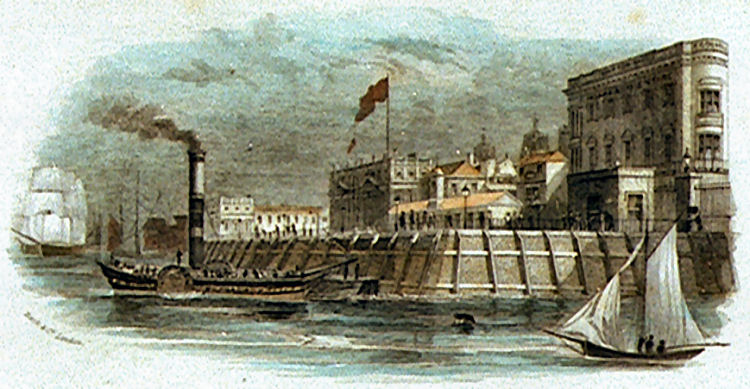
It was later replaced by the final "Ship Hotel," slightly
further east later on (i.e outside the RNC grounds on the site of
the old "Peter
Boat" - though much bigger). |
LICENSEE LIST
CLARK Joseph 1823-34+

CLARKE Amy 1832+

LEE Charles 1854+

 QUARTERMAINE Thomas 1855-Nov/67 dec'd (age 54 in 1861
QUARTERMAINE Thomas 1855-Nov/67 dec'd (age 54 in 1861 ) )
PYCROFT Thomas T 1871-74+ (age 26 in 1871 ) )
BALE William Thomas 1881-1907+ (age 43 in 1891 ) )
CATTANACH William 1908+
ABBOTT Walter John 1911+ (age 36 in 1911 ) )
https://pubwiki.co.uk/ShipTavern.shtml
http://www.closedpubs.co.uk/ship.html
 From the Pigot's Directory 1823 From the Pigot's Directory 1823
 From the Pigot's Directory 1832-33-34 From the Pigot's Directory 1832-33-34
 Census Census
 West Kent Guardian West Kent Guardian
|








